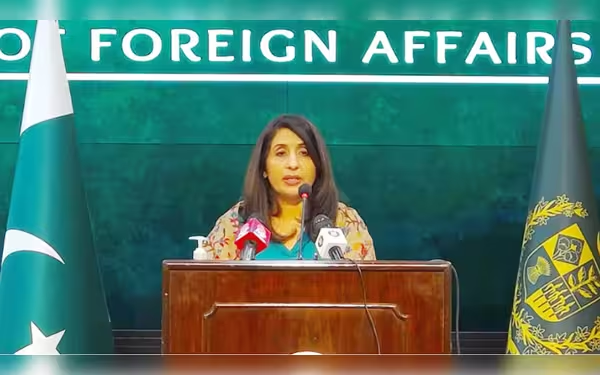Saturday, November 16, 2024 07:47 PM
Pakistan Foreign Office Condemns US Sanctions as Biased
- Pakistan labels US sanctions as politically motivated.
- Previous sanctions based on suspicion, not evidence.
- Call for dialogue over punitive measures emphasized.
 Image Credits: radio.gov.pk
Image Credits: radio.gov.pkPakistan's Foreign Office criticizes US sanctions as biased and calls for constructive dialogue.
The recent decision by the United States to impose sanctions on certain commercial entities in Pakistan has sparked significant controversy. The U.S. government claims that these entities have alleged connections to Pakistan's ballistic missile program. However, the Foreign Office of Pakistan has strongly criticized this move, labeling it as "biased" and politically motivated.
Foreign Office Spokesperson Mumtaz Zahra Baloch addressed the media, expressing Pakistan's discontent with the U.S. sanctions. She emphasized that the previous listings of commercial entities were often based on mere suspicion rather than concrete evidence. This raises questions about the fairness and transparency of the U.S. actions, as they seem to target Pakistan without substantial justification.
Pakistan has a long history of navigating complex international relations, particularly with the United States. The imposition of sanctions can have serious implications for the economy and the reputation of the affected entities. It can also strain diplomatic ties between the two nations, which have seen ups and downs over the years.
In her remarks, Baloch highlighted the need for a more balanced approach from the U.S. government. She called for dialogue and cooperation instead of punitive measures that could hinder progress and mutual understanding. The Foreign Office's stance reflects a broader sentiment within Pakistan that seeks to address concerns through constructive engagement rather than confrontation.
As the situation unfolds, it is crucial for both countries to consider the long-term effects of their actions. Diplomatic relations are built on trust and respect, and it is essential for the U.S. to recognize the importance of fair treatment in international dealings. Moving forward, both nations must strive for a relationship that fosters collaboration and peace, rather than one marred by suspicion and sanctions.













